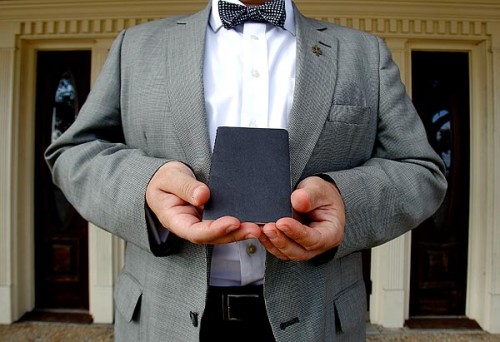Embalmer Glenn Bergeron holds a booklet of the names of those he has worked on at the Thibodaux Funeral Home in Thibodaux, La.
Say what you like about embalming, a lot of the people who do it feel like this about it.
Bergeron had been in seminary four years when he lost his calling, drawn more to the prospect of marriage and having a family. He was 32, an aspiring poet and essayist as versed in the music of Mississippi John Hurt as in the writings of St. Augustine.
After visiting an embalming room, he had found in death a way to stay close to God. The room’s tiled space seemed to him no less sacred than a church. The embalmers, dressed in aprons, sleeves rolled up, attended to corpses laid out on tables that looked like altars. Their work reminded him of the preparation of the Eucharist during Mass, something profound and holy.
Entire article in the Los Angeles Times here.



The restoration of a horrifically mutilated child’s body so his tormented mother can see him again is indeed good work. The routine and unnecessary denial of the physical aspects of death is part of a paternalism that excludes people from a properly meaningful encounter with their mortality.
Very Lynchian in tone, isn’t it?
This story resonated for me, as I’m sure it does for many others who do this work. What is moving and transcendent is the care and tenderness given to the physical remains another human – a gift to the dead and the caregiver alike. This can happen on a pyre, or in a ritual washing too.
I applaud the dedication and calling of these men, but why should this experience be the sole province of the embalmer? I wish more families had the opportunity to participate in this powerful process of giving a last gift to their loved one.
I’d love to be able to agree with you about transcendence, Patrick, and I’m sure embalmers get high on their skills, but embalming just looks to me like mutilation unless there’s a good reason for it. Such a ‘meaningful encounter with [our] mortality’ that Rupert speaks of can, with careful handling, bring someone forward through acceptance, and in my opinion it needs to be at least encouraged by those able to facilitate it. That’s just good practice. There are many, however, who are carelessly permitted an unsupported confrontation with an unattractive dead body that they’re not prepared for. That’s bad… Read more »